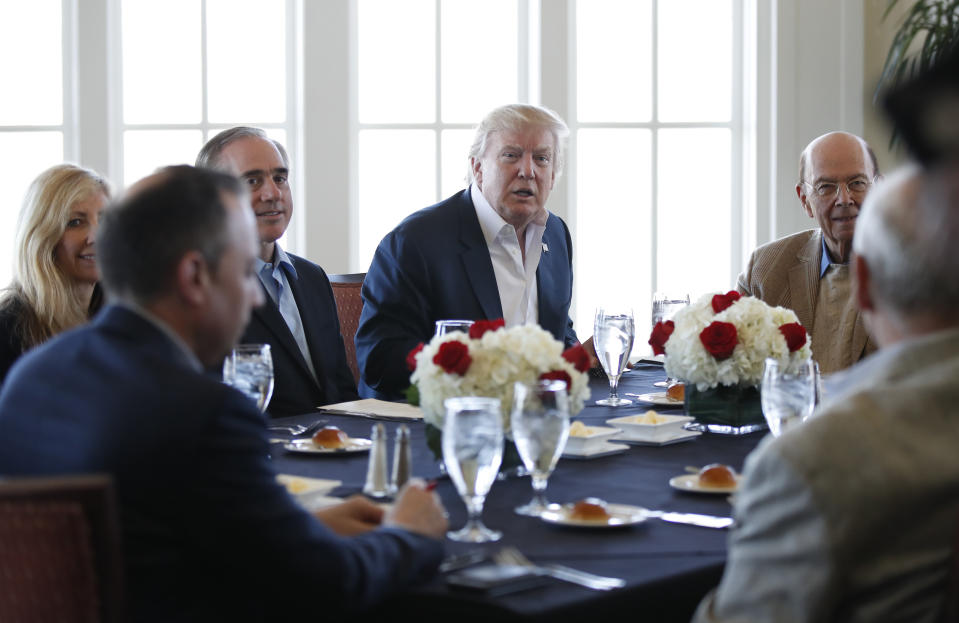What Trump's intriguing NAFTA changes say about his other promises

President Donald Trump took a hard anti-Nafta line during his campaign, calling it a “disaster,” a “catastrophe,” and “the worst trade deal.” However, a recent draft of proposed changes to the North American Free Trade Agreement obtained by Yahoo Finance suggests that Trump’s stance has moderated, and that he would like much of the trade agreement between Mexico, Canada, and the US to remain in place.
As first reported by the Wall Street Journal, the draft proposal keeps some of the controversial parts of Nafta, like measures that allow for arbitration instead of local courts. While the Journal refers to the changes as softening, the CBC in Canada noted that the changes are more than the “minor tweaks” discussed during the last visit by Canadian Prime Minister Justin Trudeau.
An “America First” presence in the administration’s current thinking manifests in myriad ways. The draft discusses seeking “a safeguard mechanism to allow a temporary revocation of tariff preferences, if increased imports from Nafta countries are a substantial cause of serious injury or threat of serious injury to the domestic industry.” The draft also seeks to allow for the US “to vigorously enforce and promote its trade remedy laws,” and includes language that seems to call for the refund of value-added taxes for products destined for the US.
Though the draft is one of renegotiation and contains advocates for “safeguard mechanisms” and “trade remedy laws” that could certainly be aggressive, it’s devoid of typical Trump rhetoric of even discussing leaving the Nafta agreement, directly referencing big border tariffs, or railing against Mexico taking advantage.
It’s important to remember this is a draft of just Nafta proposals, which deals solely with North America. On Friday, Trump reminded the world of this fact by signing executive orders to examine the causes of US trade deficits around the world—why more value is imported than exported from a country.
Friday’s executive orders also pave the way for tighter trade enforcement when a country tries to drive down its prices and hurt American companies’ ability to compete. Trump is taking steps to boost US manufacturing, but it may not add many jobs as high domestic manufacturing output does not equate to high employment in that sector.
With this Nafta draft, a theme emerges that runs along the oft-repeated lines of whether to take Trump’s aggressive tweets and rhetoric at face value. When it comes to executive action, which doesn’t require much in the way of negotiation, the president has shown a bite comparable to his bark. But for things that involve negotiations and Congress, he has softened considerably.
For example, the American Health Care Act, fathered by Speaker Paul Ryan and strongly supported by Trump, was far less aggressive than a scorched-earth Obamacare repeal he campaigned on. The plan offered subsidies, but its CBO score showed it would have left 24 million uninsured – and erased any feeling of “softening.” Similarly, while a border wall may be built, it will be funded by taxpayers.
For the markets, these “softenings,” hard as they may be, can be read as a subtle indication of how the future may play out when it comes to making deals with Congress on big things like tax reform and infrastructure, as well as smaller things like prescription drug pricing negotiations.
Related:
Ethan Wolff-Mann is a writer at Yahoo Finance focusing on consumer issues, tech, and personal finance. Follow him on Twitter @ewolffmann. Got a tip? Send it to [email protected].
Read more:
Facebook’s copy of Snap stories is a reminder of a Silicon Valley hard truth
Jared Kushner’s ‘innovation’ office will get advice from Bill Gates, Tim Cook and Elon Musk
The trick to getting credit card fees waived? Just ask
These two companies lobby to make your taxes way harder
Chase’s Sapphire Reserve is very worth it, even with its slashed bonus
51% of all job tasks could be automated by today’s technology